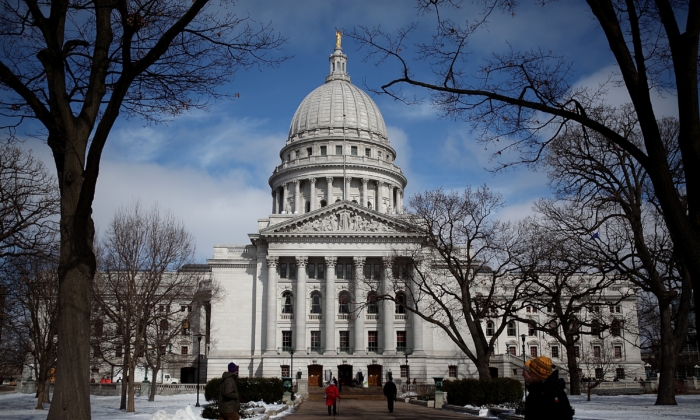
By Caden Pearson
With Republicans currently holding six of Wisconsin’s eight seats in the House, the decision has potential ramifications for the upcoming elections.
The liberal-majority Wisconsin Supreme Court handed a victory to Republicans on Friday as it rejected a bid by Democrats to revisit the state’s congressional maps.
The maps, signed into law last month by Democratic Gov. Tony Evers, had faced scrutiny from Democrats who sought changes ahead of this year’s congressional elections in the swing state.
The brief order issued by the court did not provide the reasoning behind the decision, and it did not detail the positions of the seven justices.
The state Supreme Court’s decision not to hear the challenge came after it ordered new legislative maps in December, finding the Republican-drawn ones unconstitutional.
With Republicans currently holding six of Wisconsin’s eight seats in the House, the decision has potential ramifications for the upcoming elections.
Mr. Evers signed the new legislative districts into law on Feb. 19 after Republicans folded in support to avoid the Supreme Court drawing up the new boundaries that could be even more unfavorable in the case of a stalemate, which happened last year in another legal case.
The new maps change the boundary lines for congressional districts that will be in effect during the upcoming November elections.
Earlier this year, Democrats had urged the court to solicit new congressional map proposals that “comply with Wisconsin law” following a change approved by the state Supreme Court’s new liberal majority.
Their filing noted the court’s constitutional duty to independently assess the validity of the maps, arguing that failure to act would subject Wisconsin voters to a decade under maps lacking a basis in state law.
This alleged failure would “double down on a now-discredited legal principle,” according to the filing, specifically the “least change approach,” which was struck down last year once the state Supreme Court had a liberal majority.
The contested maps were selected by the court in March 2022 and signed into law in February by the governor.
‘Reckless Abandonment’ of Legal Precedent
Conservative Justice Rebecca Grassl Bradley criticized the court’s liberals in a concurring opinion on Friday, condemning what she termed the majority’s “reckless abandonment” of legal precedent, which she wrote could incentivize “litigants to bring politically divisive cases” regardless of their legal merit.
“While the court rightfully denies this motion, it likely won’t be long until the new majority flexes its political power again to advance a partisan agenda despite the damage inflicted on the independence and integrity of the court,” she wrote.
Chief Justice Annette Kingsland Ziegler, also a conservative, joined Justice Bradley in the concurring opinion.
However, Justice Janet Protasiewicz, a liberal who was elected to the court last year, giving liberals the majority on the bench, did not participate in the order. Her abstention, combined with the conservatives’ votes, allowed the rejection of the bid by Democrats.
The Wisconsin Legislature filed a motion to recuse targeting Justice Protesiewicz.
In a separate order addressing their motion on Friday, Justice Protasiewicz explained that she declined to participate in the proceeding because she was not “a member of the court when it issued” a 2022 ruling on the state’s congressional map at the heart of the matter that voters sought reconsideration.
Wisconsin Institute for Law and Liberty President Rick Esenberg praised the court’s decision. Along with the Republican-controlled Legislature, his conservative organization had sought the justice’s recusal.
“This matter was settled two years ago, and there is no need to redraw the congressional maps,” Mr. Esenberg said in a statement. “The request to redraw these maps was both procedurally improper and legally wrong, and we are glad the Court has declined the invitation to revisit this matter.”
The legal proceedings stemmed from a group of voters seeking to reopen previous litigation over the state’s congressional map. The 2022 Wisconsin Supreme Court ruling, known as Johnson v. Wisconsin Elections Commission, favored the Republican-controlled Legislature’s proposed congressional map, citing the now-defunct “least change principle.”
However, a December 2023 ruling in a separate case, Clarke v. Wisconsin Elections Commission, saw the newly liberal 4–3 majority overturn the court’s “least change approach” for legislative maps, emphasizing the constitutional requirement for districts to be contiguous, meaning sharing a common border or touching.
Since the Clarke ruling, the state has implemented new legislative maps for future elections.
Friday’s order means that Wisconsin’s current congressional districts will remain in place for the upcoming elections. Nevertheless, it does not eliminate the possibility of future litigation challenging the state’s congressional districts beyond 2024.
As a result of today’s order, Wisconsin’s current congressional districts will remain on the books. However, the order does not preclude new litigation challenging the state’s congressional districts for future elections beyond 2024.
Caden Pearson is a reporter covering U.S. and world news.

